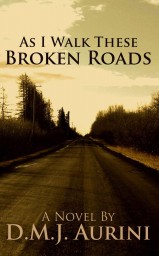 Set in post-apocalyptic Ontario, the book opens with a very Western feel. A laconic stranger walks into a small isolated town. Village of Blackstock, Population 800. He quickly gets acquainted with the bartender and the town’s mechanic. Nobody knows the armed newcomer but soon there is someone spreading rumors about him.
Set in post-apocalyptic Ontario, the book opens with a very Western feel. A laconic stranger walks into a small isolated town. Village of Blackstock, Population 800. He quickly gets acquainted with the bartender and the town’s mechanic. Nobody knows the armed newcomer but soon there is someone spreading rumors about him.
This first part of the book is rather slow and peaceful, almost quaint. You know, very Anti Mad Max. We get to know Wentworth, the protagonist, a little bit. Apparently, all he wants is to get his motorcycle repaired but he doesn’t seem to know where he’ll be heading to next. That’s not much character motivation to fuel a first third of the book. At least, it creates the need for a mechanic, and that’s how we meet the guy that will become protagonist’s sidekick, Raxx.
At the local bar or travelling some road, Wentworth and Raxx talk about several things and their conversations soon turn philosophical. They realize their world has lost so much and the people around them are not really rebuilding anything, they just keep some things going.
We’re squatting on the shoulders of giants. It’s . . . it’s ignorance on purpose, and it’s everywhere. It’s like knowledge scares people – you know what? I think it does.
Then, as Aurini begins to show us the human side of the locals, all hell breaks loose. Here comes the first plot twist and the action scenes begin. By far, the best part of the book.
Aurini hints at his own military past by having Wentworth train Raxx. Slowly, the mysterious protagonist opens up and admits that he was once part of a military organization. Or rather, an organization that clings to its military past to try to survive in this seriously messed up world.
By the time these first action scenes are over we are two thirds into the story and the book seems to plunge into a languid epilogue very reminiscent of the introductory chapters. The duo have won a battle but as the song said still haven’t what they are looking for. And the thing is that it is never quite clear what they are actually looking for to begin with.
We’re blinded wise men, wandering along broken roads, past decaying ruins. Our throats have betrayed us, and we can’t tell our tales. Our hands tremble when we try to write them down. Our memories have faded, and our exploits have become meaningless. We have all the solutions, but we’ve forgotten the questions…
In that sense, the book doesn’t seem so much to be speculation about a future disaster but about the present directionless unfocused generations.
By the way, the protagonists do not really walk down broken roads. Wentworth rides a motorcycle and Raxx has a truck. And they actually have to avoid some roads that are too broken for those vehicles.
Anyway, the apparent languid epilogue isn’t really the end of the story and the book goes on into an eclectic third part.
In the final chapters we can find the two travelers exploring a deserted major city but also listening to radio broadcasts or discussing a certain book from our present. From time to time it looks like Aurini is going to tell us what The War was about. Who started it? Why? There are hints about eugenics, food manipulation, poisoning, and propaganda, even some more sci-fi stuff. But that part of the story remains shrouded in mystery, and that doesn’t hurt the book at all.
Two of the three big confrontations in the book have a very interesting element in common: failure of leadership. Or more specifically, treacherous leaders. A few misguided men in positions of power, blinded by pride, lead their own people to spectacular disasters. It is easy to imagine that the unexplained causes of The War have much in common with this too.
Despite the uneven paces, the book is really pleasant to read (unless you need non-stop break-neck action). And Aurini manages to depict a failed world without indulging in the vicious pessimism that is so common in post-apocalyptic stories. To his credit Aurini also avoids the temptation to graphically exploit the abuses perpetrated by the evildoers. This story is not a sadistic warning about how bad things can get if we don’t do things right but rather about how much can be accomplished even when all seems lost.
RATING: 7/10
I read this one too. Thoughtful,a little speculative, but rather realistic action scenes and decent characters carry the reader through.
This book was great. It read like a post-apocalyptic Zen and the Art of Motorcycle Maintenance. It tells HOW the dystopian denizens of the future came to become a collection of groupthink sheeple. Aurini treats us to the psychology of that day. I really think this is a red-pill book, and its value goes beyond the plot.
If you’ve played any Fallout, you may be able to peg Wentworth for a Brotherhood of Steel Paladin, inspired by Veronica, a Brotherhood scribe who questions the archaic traditions of her Family. New Vegas has a Western setting. And one of the early quests in Fallout 3 involves navigating through downtown Washington DC (specifically, the metro tunnels), optionally listening to a newly discovered radio station, to find a replacement radio antenna for said radio station’s array. Most players do tune in for the quality music. If, after reading this book, you find it to have a similar feel and to discuss a similar philosophical topic (aimless leaders bringing the world to ruin and humanity’s will to reconstitute itself) to the Fallout franchise, that isn’t an accident. That it’s so obvious, may be.